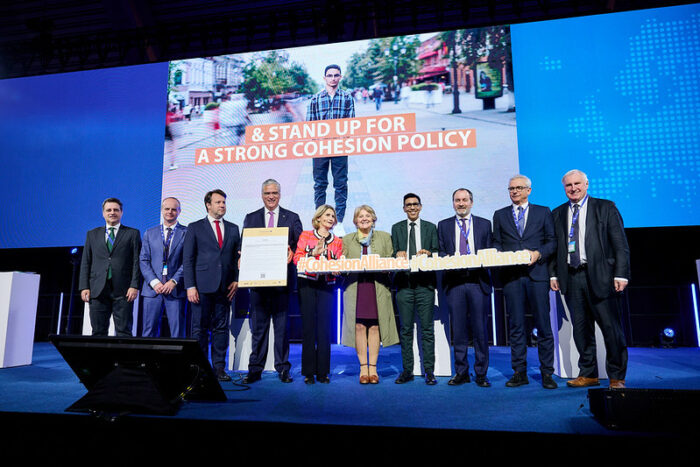The Progressive Post
Implementing the freedom to stay

When I began working on the report Much more than a market, I quickly realised from several interviews that the single market is not perceived as inclusive for everyone today. Europe, in general, is seen to be not for everyone. Europe was initially built by an elite group of visionary politicians who aimed to secure prosperity and peace for future generations. However, for a long time, Europe was not particularly visible or tangible to all citizens. Now, our Union is an integral part of everyone’s life, with an estimated 60 per cent of national legislation originating from EU laws. With a Union that is so pervasive comes the responsibility of delivering for everyone.
Jacques Delors once said that falling in love with the single market is impossible. However, I believe there is potential to ignite people’s passion for Europe – if they can see the benefits of participating in such a vast market. My generation was at university when the Berlin Wall fell. It was during that period that the single market was created. For many of us, the four freedoms became a source of passion, dreams, emotions and aspirations.
Today, the European project and the single market are primarily supported by those who are cosmopolitan, who want to move and have the means to do so, those who speak multiple languages and who aspire to work in another country. They strongly support the mobility that the single market allows and the opportunities it offers. However, what we need now is a European project that responds to the needs and expectations of all Europeans.
The single market can no longer be an initiative where the only benefit for non-mobile citizens is accessing international goods at a more affordable price. This premise no longer holds true and would not be sufficient anyway. One of the main points of the report is to emphasise the idea of the freedom to stay. This means that the European single market should cater for everyone and benefit even those who do not plan to move out of their region. It means that the Union should allow our people to choose their future. This entails ensuring that Europe does more for those living in depressed areas than merely providing them with the right to relocate to another country.
When I started writing the report, Jacques Delors told me that the only reason the single market has been accepted and regarded as a success by all member states is that it was launched simultaneously with the cohesion policy. In a more competitive single market, not everyone wins, and the regional focus of EU action has been pivotal in ensuring that every citizen in the Union can benefit from the European project. The lesson from Delors is that building a prosperous single market would not be possible without regional convergence and territorial cohesion.
Brain drain has become a challenge for many European countries and regions, as they often lose their youngest and best-prepared individuals. The countries that trained these people invested public resources in their education, yet the returns on such investments go to countries with net inflows of workers from other member states. As these individuals move out, donor countries lose their productivity and innovation potential, and end up with a weakened public administration and compromised prospects for sound public finances. This creates a vicious circle: as weaker regions lose people, their development gap with the rest increases even further.
Mobility across the Union is an advantage and a privilege and should be incentivised. However, permanent and structural transfers of people should be politically unacceptable, even more so than permanent and structural financial transfers. David Rinaldi, director of studies and policy at FEPS, suggests the creation of an EU Fund for Just Mobility. While this proposal may be ambitious and while it may be challenging to garner political support for it from our Union, we should not shy away from striving for progress in this domain.
A recent report by the High-Level Group on the Future of Cohesion Policy shows that in 2023, about 135 million people, nearly one-third of the EU population, lived in regions that have slowly fallen behind over the last two decades. Residents of these declining regions often feel they have no opportunities except to relocate. Can Europe address this issue? If it wants to, it must act. The alternative is increasing divergence and a further loss of trust in political parties, public institutions and the European project.
Here are a few points where action should be taken:
- Investment in administrative capacity: the EU cohesion policy is already playing a crucial role in supporting local public administration and investment, but the EU should go beyond providing investment for infrastructures. The financial investments arranged through structural funds should be accompanied by substantial technical and strategic assistance so that the strategic planning, and administrative and implementation capacity in each area of Europe can meet the local development needs.
- Universal access to services of general interest (SGIs): gaps in the universal service provision prevent a number of EU citizens from effectively accessing the single market. This concerns education, health, water, sanitation, energy, transport, financial services and digital communications. Rural areas, remote regions, islands, mountains and sparsely populated areas face the highest barriers to access.
- A European initiative for affordable housing: another obstacle to the freedom to move or stay is housing affordability, which also affects the receiving areas (big cities), and not just the areas that face depopulation. While housing policy falls within the realm of member states or local authorities, the EU possesses a range of instruments and policies that have an impact on the housing markets across the EU. They need to be revised to make sure that they incentivise socially inclusive and sustainable housing systems
Finally, to ensure a comprehensive and sustainable approach to addressing internal territorial imbalances, it is crucial to regularly monitor these disparities. This must be integrated into the framework of the European Semester. To sum up, we must ensure that any development of the single market includes a genuine local well-being dimension guaranteeing social and territorial cohesion. We should not see the divergence as collateral damage and choose to do nothing about it. This is not the Europe we want, and ultimately it would harm the single market itself because of disintegration or the weakening of demand for goods and services in the European Union.
We want Europe to flourish, a Europe where mobility is a choice and where it is circular: not only from east to west and from south to north, but in all directions. And those who want to stay should be able to do so because they can find good services and economic activities in their area. The interests and well-being of citizens are at the core of our Union. For the single market to be successful, it must be more than just a technocratic exercise: it must represent a shared vision and provide common benefits for all Europeans.
Photo Credits: Shutterstock.com/R.classen




